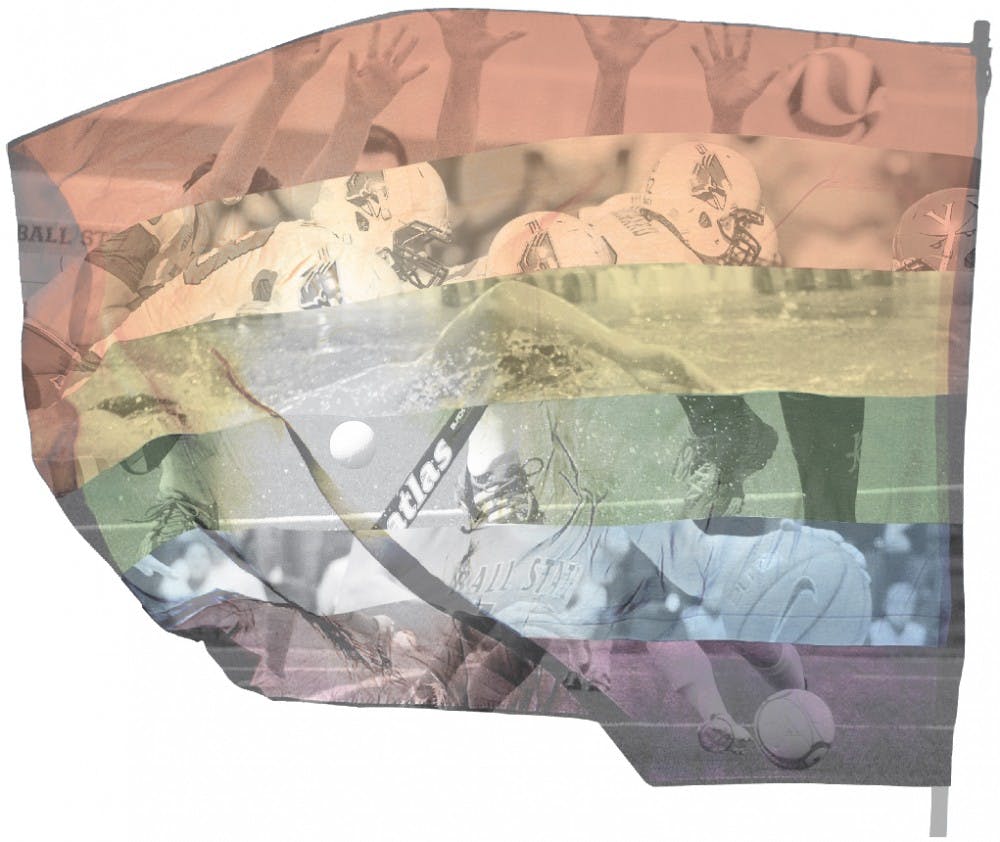
It took two months for a club volleyball player to share his sexual orientation with teammates his freshman year.
Austin Acel, a sophomore professional sales and French major, said he would suppress his usual energetic personality on the court.
When he finally got the nerve to come out to the team’s captain, Hunter Klein, he said the team already knew.
“I’m really mad I did it so late,” Acel said. “It was a positive and warming experience once I did it. I felt like I could completely be myself. They’ve never treated me different because of it.”
Nationally, athletes have recently announced their sexuality in both the NBA and college football.
On April 29, 2013, NBA player Jason Collins publicly announced he was gay through a Sports Illustrated cover story, according to The Associated Press. Collins, then a free agent, signed a pair of 10-day contracts with the Brooklyn Nets in late February and early March.
On March 15, the Nets signed Collins for the remainder of the 2013-14 season.
Former Missouri defensive end Michael Sam publicly came out Feb. 9. If drafted into the NFL in early May, he would become the first openly gay player in the NFL.
“If a big-name athlete on Ball State’s campus came out, I think Ball State’s ready,” Acel said.
Maimee Morris played on the Ball State soccer team from 2010-13.
Coming from Worcestershire, England, Morris had to adapt to not only American culture but to being the only lesbian on the team.
Early in her college career, another player expressed her discomfort with Morris when they first met, citing religious reasons.
Morris said religion is very different in England. She said Christianity is more by the Bible in America than overseas.
“That was the first time I’ve ever really questioned it,” Morris said. “I thought, ‘Should I be more cautious about who I am?’ But the way I am is no different to anyone else. The only difference is that I like girls instead.”
If a teammate was worried about showering with her, Morris would wait until that person was done showering before taking her turn, at least at first. Once her teammates got to know her, it wasn’t a problem.
Morris worked on being more approachable to other players in the future, embracing the role of teaching others about diversity.
Currently, she is back in England, doing an internship in Birmingham.
“I’ve really enjoyed changing people’s minds and changing their opinions,” Morris said.
 Austin Acel volleys the ball during a match.
Austin Acel volleys the ball during a match.Not everybody believes athletics is ready for gay athletes, though. In a Sports Illustrated interview in February, an anonymous NFL scout said, “Unfortunately, this is a lot more OK in society than it is in lots of locker rooms. Some locker rooms are still stuck in the ’50s.”
Some athletes also have publicly admitted having problems with a potential gay teammate. Jonathan Vilma, a former linebacker with the New Orleans Saints, said in a CNN interview, “Imagine if he’s the guy next to me and, you know, I get dressed, naked, taking a shower, the whole nine, and it just so happens he looks at me. How am I supposed to respond?”
He also tweeted in 2011, “Grown men should NOT hav [sic] female tendencies. Period.”
At Ball State, the football and men’s basketball coaches said they wouldn’t think a gay athlete would be an issue.
“I don’t think it would be as big of a deal as a lot of people think it would be,” James Whitford, men’s basketball head coach, said. “I’m sure there are some people who might have some religious beliefs that would make it particularly hard for them.”
Joseph Fazio, a former Ball State football player, was one of 25 nominees for the national Bobby Bowden Award in late 2013, given by the Fellowship of Christian Athletes to those who express their faith “in the classroom, on the field, on the campus and in the community.”
He said his faith would allow him to support a teammate if they came out.
“Everyone has the capacity and freedom to believe what they will,” Fazio said. “As Christians, we are called to be Christ-like and lead others toward God and heaven. We are not called to judge others based on sexuality, hair color, tattoos or anything else.”
Fazio was a member of the team from 2009-2013 and played in 39 games.
Both Whitford and football head coach Pete Lembo said sports can bring people of different backgrounds together.
“Sports has often been a mode of breaking through things like that, whether it be racist attitudes, homophobic attitudes or other types,” Whitford said. “A lot of times, sports has been a way to teach society to change.”
Lembo said a trusting, family culture in the locker room can help a team deal with potential internal issues.
“It’s things like this that you say, ‘Here’s a subject that might be somewhat unusual’ or in some people’s eyes, controversial,” he said. “But when you have the right kind of culture in your program, you can deal with those kinds of things.”
Whitford said while he puts down the groundwork for what goes on in the locker room, he ultimately isn’t in there when his players are.
“It’s hard for me to know what goes on in the locker room when we only have 13 players,” Whitford said. “I can only imagine what it would be like in a football locker room. I don’t know how the coaches know the names of the players, much less what’s going on in the locker room.”
With such large numbers, the football team works on team building exercises in the preseason. The entire team is split up into six smaller teams.
Players of different leadership backgrounds, positions, years and academic standings are put together. The teams get points for different criteria such as community service, weight room results and academic results.
“It serves to bring your team closer together in the offseason,” Lembo said. “You can talk all you want about family and culture, but if you don’t work at it, it’s not going to happen.”
Lembo has been a football coach, in one capacity or another, for more than 20 years. He equated the changes he’s seen as a coach to those in society.
“There was a time when a female reporter in the locker room after a game never happened,” Lembo said. “Nothing ever stays the same in life.”
Acel thinks more athletes will come out in the near future.
“Time will tell,” he said. “It’s slowly getting better, which is nice. In the next couple of years, we’ll have this boom. People will call it ‘the gay boomers.’”





